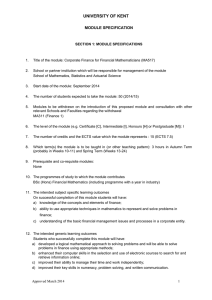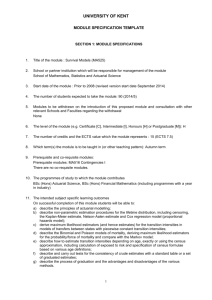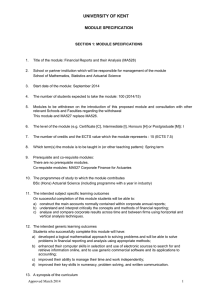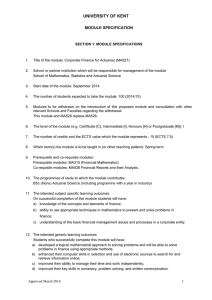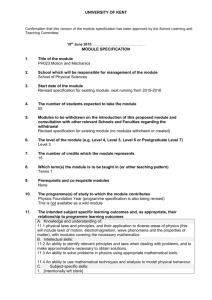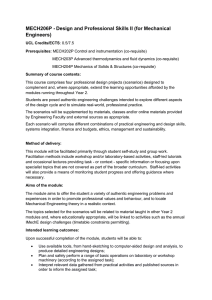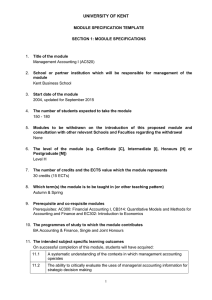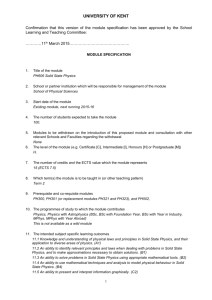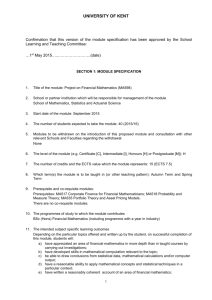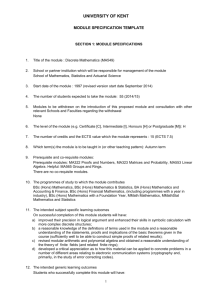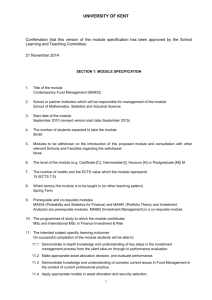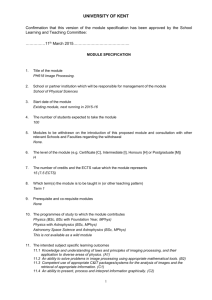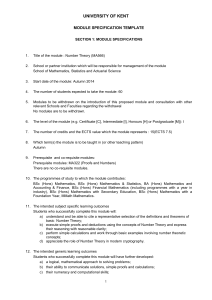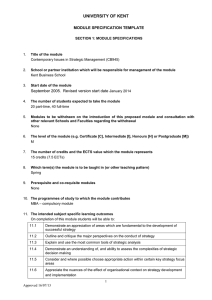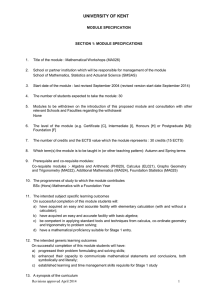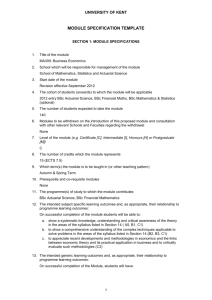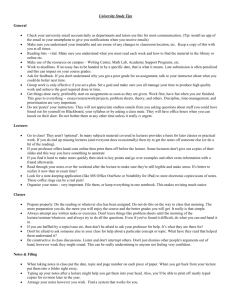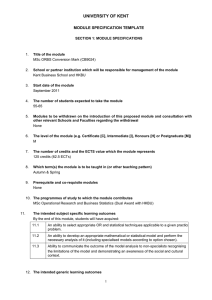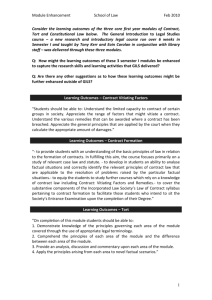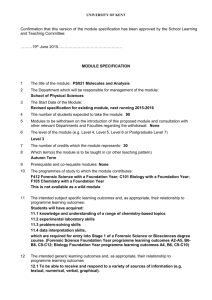section 1: module specifications
advertisement
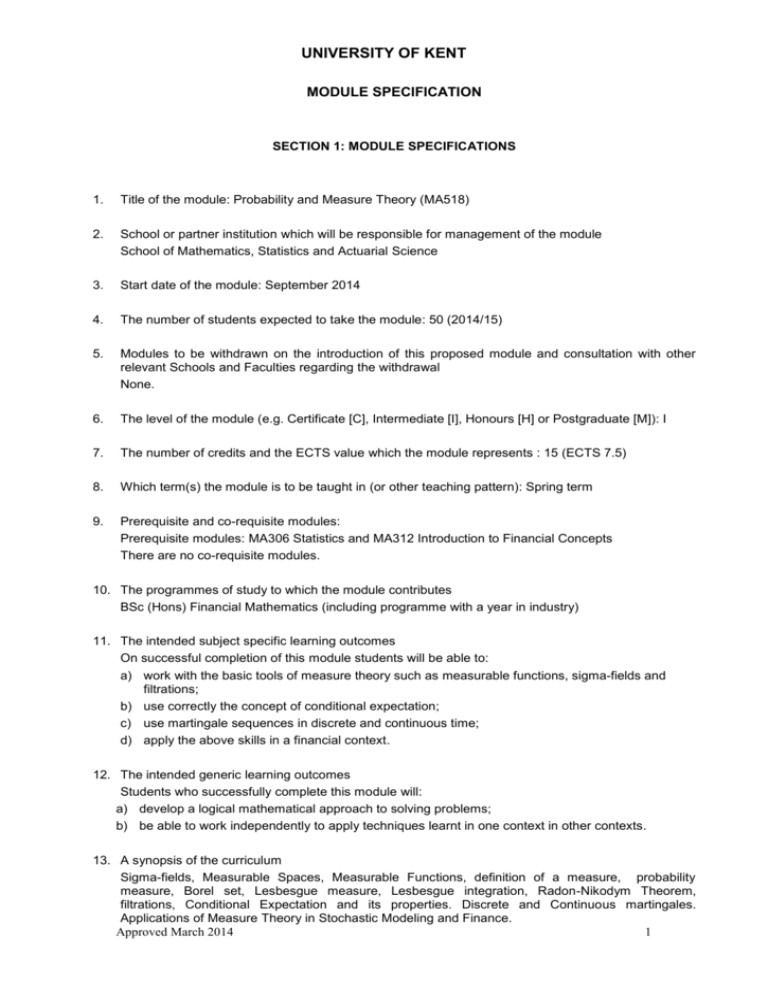
UNIVERSITY OF KENT MODULE SPECIFICATION SECTION 1: MODULE SPECIFICATIONS 1. Title of the module: Probability and Measure Theory (MA518) 2. School or partner institution which will be responsible for management of the module School of Mathematics, Statistics and Actuarial Science 3. Start date of the module: September 2014 4. The number of students expected to take the module: 50 (2014/15) 5. Modules to be withdrawn on the introduction of this proposed module and consultation with other relevant Schools and Faculties regarding the withdrawal None. 6. The level of the module (e.g. Certificate [C], Intermediate [I], Honours [H] or Postgraduate [M]): I 7. The number of credits and the ECTS value which the module represents : 15 (ECTS 7.5) 8. Which term(s) the module is to be taught in (or other teaching pattern): Spring term 9. Prerequisite and co-requisite modules: Prerequisite modules: MA306 Statistics and MA312 Introduction to Financial Concepts There are no co-requisite modules. 10. The programmes of study to which the module contributes BSc (Hons) Financial Mathematics (including programme with a year in industry) 11. The intended subject specific learning outcomes On successful completion of this module students will be able to: a) work with the basic tools of measure theory such as measurable functions, sigma-fields and filtrations; b) use correctly the concept of conditional expectation; c) use martingale sequences in discrete and continuous time; d) apply the above skills in a financial context. 12. The intended generic learning outcomes Students who successfully complete this module will: a) develop a logical mathematical approach to solving problems; b) be able to work independently to apply techniques learnt in one context in other contexts. 13. A synopsis of the curriculum Sigma-fields, Measurable Spaces, Measurable Functions, definition of a measure, probability measure, Borel set, Lesbesgue measure, Lesbesgue integration, Radon-Nikodym Theorem, filtrations, Conditional Expectation and its properties. Discrete and Continuous martingales. Applications of Measure Theory in Stochastic Modeling and Finance. Approved March 2014 1 UNIVERSITY OF KENT 14. Indicative Reading List Resnick, Sidney, A Probability Path, 2003, Birkhauser Williams, David, Probability with Martingales, 1991, Cambridge University Press Klenke, Akin, Probability Theory: a comprehensive course, 2014, Springer 15. Learning and Teaching Methods, including the nature and number of contact hours and the total study hours which will be expected of students, and how these relate to achievement of the intended module learning outcomes. No of contact hours: 48 (48 lectures/ example classes/supervised problem solving sessions) Independent study hours: 102 Total study hours: 150 Teaching methods will comprise a mix of lectures and example classes/supervised problem solving sessions. Subject specific learning outcomes 11(a)-(d) and generic learning outcomes 12(a),(b) will be addressed by the lectures and classes/problem solving sessions. Generic learning outcome 12(b) will be developed by work on the coursework assessments. 16. Assessment methods and how these relate to testing achievement of the intended module learning outcomes This module is assessed by coursework (20%) and by examination (80%). Coursework: This will normally consist of class tests and/or open-book written assignments mostly completed by students outside contact hours (assessing learning outcomes 11(a)-(d) and 12(a),(b)). Examination: A 2-hour unseen written examination in the Summer Term that consists of a mix of short and long answers that test to varying levels of proficiency learning outcomes 11(a)-(d) and 12(a),(b). 17. Implications for learning resources, including staff, library, IT and space The module has been designed as a dedicated module for the BSc in Financial Mathematics. Extra teaching resources required for the module will be met within the Statistics group of the School. Relevant books and other reading material will be made available in the library and the university bookshop. There are not expected to be any additional IT or Library resource requirements. 18. The School recognises and has embedded the expectations of current disability equality legislation, and supports students with a declared disability or special educational need in its teaching. Within this module we will make reasonable adjustments wherever necessary, including additional or substitute materials, teaching modes or assessment methods for students who have declared and discussed their learning support needs. Arrangements for students with declared disabilities will be made on an individual basis, in consultation with the University’s disability/dyslexia support service, and specialist support will be provided where needed. 19. Campus where module will be delivered: Canterbury Approved March 2014 2 UNIVERSITY OF KENT SECTION 2: MODULE IS PART OF A PROGRAMME OF STUDY IN A UNIVERSITY SCHOOL Statement by the School Director of Learning and Teaching/School Director of Graduate Studies (as appropriate): "I confirm I have been consulted on the above module proposal and have given advice on the correct procedures and required content of module proposals" ................................................................ Director of Learning and Teaching/Director of Graduate Studies (delete as applicable) .............................................. Date ………………………………………………… Print Name Statement by the Head of School: "I confirm that the School has approved the introduction of the module and, where the module is proposed by School staff, will be responsible for its resourcing" ................................................................. Head of School .............................................. Date ……………………………………………………. Print Name Module Specification Template Last updated February 2013 Approved March 2014 3
